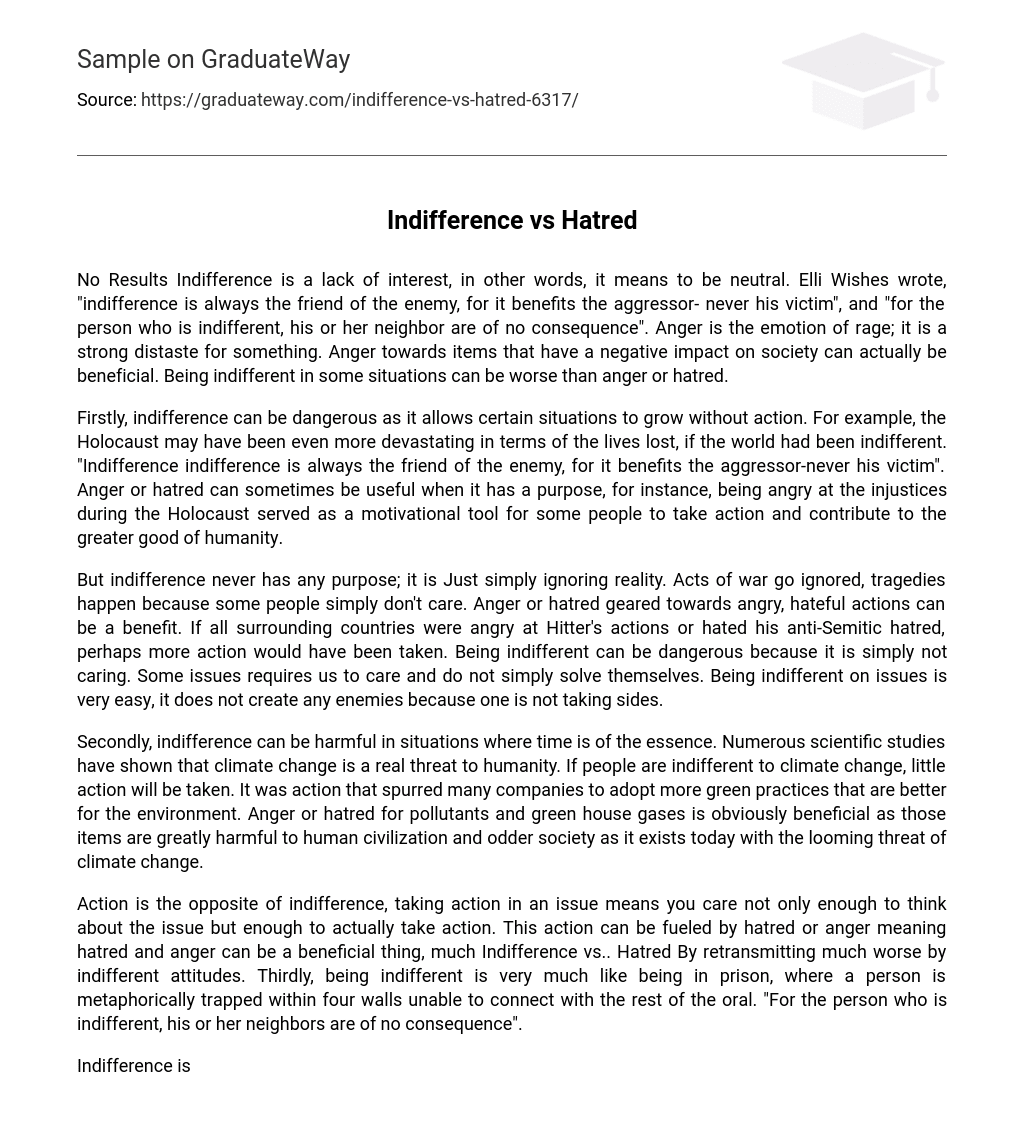No Results Indifference is a lack of interest, in other words, it means to be neutral. Elli Wishes wrote, “indifference is always the friend of the enemy, for it benefits the aggressor- never his victim”, and “for the person who is indifferent, his or her neighbor are of no consequence”. Anger is the emotion of rage; it is a strong distaste for something. Anger towards items that have a negative impact on society can actually be beneficial. Being indifferent in some situations can be worse than anger or hatred.
Firstly, indifference can be dangerous as it allows certain situations to grow without action. For example, the Holocaust may have been even more devastating in terms of the lives lost, if the world had been indifferent. “Indifference indifference is always the friend of the enemy, for it benefits the aggressor-never his victim”. Anger or hatred can sometimes be useful when it has a purpose, for instance, being angry at the injustices during the Holocaust served as a motivational tool for some people to take action and contribute to the greater good of humanity.
But indifference never has any purpose; it is Just simply ignoring reality. Acts of war go ignored, tragedies happen because some people simply don’t care. Anger or hatred geared towards angry, hateful actions can be a benefit. If all surrounding countries were angry at Hitter’s actions or hated his anti-Semitic hatred, perhaps more action would have been taken. Being indifferent can be dangerous because it is simply not caring. Some issues requires us to care and do not simply solve themselves. Being indifferent on issues is very easy, it does not create any enemies because one is not taking sides.
Secondly, indifference can be harmful in situations where time is of the essence. Numerous scientific studies have shown that climate change is a real threat to humanity. If people are indifferent to climate change, little action will be taken. It was action that spurred many companies to adopt more green practices that are better for the environment. Anger or hatred for pollutants and green house gases is obviously beneficial as those items are greatly harmful to human civilization and odder society as it exists today with the looming threat of climate change.
Action is the opposite of indifference, taking action in an issue means you care not only enough to think about the issue but enough to actually take action. This action can be fueled by hatred or anger meaning hatred and anger can be a beneficial thing, much Indifference vs.. Hatred By retransmitting much worse by indifferent attitudes. Thirdly, being indifferent is very much like being in prison, where a person is metaphorically trapped within four walls unable to connect with the rest of the oral. “For the person who is indifferent, his or her neighbors are of no consequence”.
Indifference is never creative, it is the inability to make decisions so therefore it should not help or hinder a situation. But in some situations not being indifferent can be more helpful for humanity than doing nothing at all. For example, during the Nazi’s rise to power, the indifference of the German citizens towards Jews allowed the initial persecution of Jewish people to happen, but if people at the time ad been more aware of what was happening and stopped it before it grew out of control many people’s lives may have been saved.
It is not simply a matter of involvement, simply saying that something is not right and taking action to promote the idea that something is not right can make great ethical strides. If society is indifferent to ethical issues, then no action is taken at all. In conclusion, indifference is much more harmful than anger or hatred in certain situations. It is so harmful because it means that often hate filled situations do not chive the backlash they should because people are indifferent and uncaring about the situation.
Secondly, time sensitive situations are hurt by indifference because people do not take action in time to deal with the issue before it escalates further. Lastly, because ethical issues often need action, ethical strides may be lost by indifferent attitudes. Society should work to be less indifferent and more thoughtful in actions, provoking people to come up with ideas and solutions which will benefit all of society as a whole.





